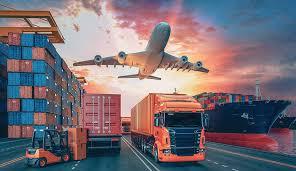Freight Brokerage Market innovations through blockchain and automated freight platforms

The freight brokerage market is undergoing rapid digital transformation as blockchain technology and automation reshape the logistics landscape.
The Role of Innovation in Freight Brokerage
As global supply chains become more complex, traditional freight brokerage methods are increasingly inadequate. Manual processes, opaque pricing, and communication delays often cause inefficiencies. Enter technology. Modern innovations—particularly blockchain and automation—are helping freight brokers deliver faster, more reliable, and secure logistics services.
With rising customer expectations for real-time visibility, traceability, and cost efficiency, freight brokers that invest in innovation are gaining a decisive market advantage.
Blockchain: Bringing Trust and Transparency to Freight Transactions
Blockchain technology offers a decentralized, tamper-proof ledger system that enables seamless data sharing across stakeholders—shippers, brokers, carriers, and regulators.
In the freight brokerage space, blockchain is being used to:
-
Create smart contracts that automate payments upon delivery
-
Record immutable shipment data such as load status, location, and transit time
-
Enhance transparency in carrier performance and cargo history
-
Minimize fraud and double brokering by authenticating every transaction
By reducing disputes and fostering trust among partners, blockchain platforms streamline brokerage operations and improve compliance across international freight corridors.
Smart Contracts for Autonomous Transactions
One of the most promising applications of blockchain in freight brokerage is smart contracts. These self-executing agreements trigger actions (such as payments) once predefined conditions are met.
For example, once a carrier confirms delivery of a load—using GPS data verified on the blockchain—the smart contract can instantly release payment to the driver or carrier. This eliminates payment delays and manual reconciliations, boosting cash flow efficiency for carriers and brokers alike.
Smart contracts are particularly beneficial in high-volume freight transactions, reducing administrative burden and cutting back-office costs.
Automated Freight Platforms: Speed, Scale, and Simplicity
Automation tools are enhancing nearly every facet of freight brokerage. From load matching and carrier onboarding to quote generation and real-time tracking, these platforms are minimizing human intervention and maximizing output.
Leading freight platforms now offer:
-
AI-driven load-board matching systems
-
Instant quote engines based on current market rates
-
Automated document handling (e.g., Bills of Lading, Proof of Delivery)
-
Integrated messaging for seamless broker-carrier communication
These features help brokers manage more shipments with fewer resources, reduce errors, and improve the customer experience.
Real-Time Load Matching and Routing Algorithms
Automation is making it easier than ever to match the right load with the right carrier in seconds. Advanced freight matching platforms use algorithms that factor in:
-
Location proximity
-
Carrier preferences
-
Vehicle type and capacity
-
Historical performance and ratings
This not only speeds up operations but also reduces empty miles and improves asset utilization across the transportation ecosystem.
Route optimization algorithms further enhance efficiency by identifying the fastest, most fuel-efficient paths—minimizing delivery times and carbon emissions.
Automated Pricing and Dynamic Rate Management
Traditional freight brokerage often struggles with real-time pricing due to fluctuating rates and capacity constraints. Automated platforms solve this by using live data from the spot market and historical shipment trends to generate instant, competitive quotes.
This ensures pricing accuracy, faster responses, and better margin control. Brokers can also adjust pricing rules automatically in response to fuel price changes, regional demand spikes, or seasonal surges.
Automation enables freight brokers to stay agile in a volatile market.
Data Integration and Ecosystem Collaboration
Modern freight tech platforms integrate seamlessly with other systems such as:
-
Transportation Management Systems (TMS)
-
Warehouse Management Systems (WMS)
-
Carrier portals and mobile apps
-
Customer ERP and analytics dashboards
This integration enables end-to-end visibility and better decision-making across the entire supply chain. Brokers can automate status updates, track KPIs, and quickly adapt to service disruptions through real-time alerts.
By serving as a data bridge between shippers and carriers, automated platforms enhance collaboration and accountability throughout the network.
Overcoming Adoption Barriers
Despite the clear advantages, adoption of blockchain and automation in the freight brokerage market is not without challenges:
-
Smaller brokers may lack technical expertise or budget to implement complex platforms
-
Legacy systems can hinder interoperability with new tech
-
Industry-wide standards for blockchain transactions are still evolving
-
Carrier resistance to change can slow full-scale adoption
However, tech providers are addressing these barriers by offering scalable, modular, and user-friendly platforms that cater to brokers of all sizes. Training programs and ecosystem incentives are also helping accelerate industry-wide adoption.
Competitive Advantages of Embracing Innovation
Freight brokers who embrace blockchain and automation are better positioned to:
-
Offer faster and more transparent services
-
Reduce overhead and boost operational efficiency
-
Gain trust from both shippers and carriers
-
Handle larger shipment volumes with fewer errors
-
Adapt quickly to market disruptions or regulatory changes
More importantly, they are seen as technology leaders, making them preferred partners for digitally-savvy clients and investors.
A Tech-Powered Future for Freight Brokers
The convergence of blockchain and automation is not a passing trend—it’s a permanent transformation. In the coming years, brokers that fail to innovate risk obsolescence, while those who lead the charge will shape the future of freight logistics.
As the freight brokerage market grows more competitive and digital-first, innovation is the path to differentiation, scalability, and long-term success.
- Art
- Causes
- Crafts
- Dance
- Drinks
- Film
- Fitness
- Food
- Games
- Gardening
- Health
- Home
- Literature
- Music
- Networking
- Other
- Party
- Religion
- Shopping
- Sports
- Theater
- Wellness


